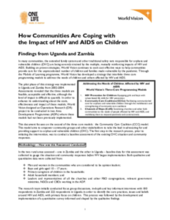In many communities, the extended family system and other traditional safety nets responsible for orphans and vulnerable children (OVC) are being severely strained by the multiple, mutually reinforcing impacts of HIV and AIDS. Building on proven strategies, World Vision continues to seek cost effective ways to help communities provide care for the unprecedented number of children and families made vulnerable by the pandemic. Through the Models of Learning programme, World Vision has developed a strategy that interlinks three core programming models to address the needs of children and others affected by HIV and AIDS.
The pilot phase of this strategy was implemented in Uganda and Zambia from 2002-2004. Assessments revealed that the three models are feasible, acceptable and effective, although the level of impact is difficult to quantify. In order to enhance its understanding about the costs, effectiveness and impact of these models, World Vision designed an Operations Research (OR) project to be conducted in two Area Development Programmes (ADPs) where these models had not been previously implemented. This document focuses on evaluating the second of the three core models: the Community Care Coalition (CCC) model. This model aims to empower community groups and other stakeholders to take the lead in advocating for and providing support to orphans and vulnerable children (OVC).
This evaluation concludes that substantial work is needed to help overcome stigma and discrimination in the community towards both OVC and the chronically ill. It is also essential to engage and empower more community members to become actively engaged in OVC care, as well as to facilitate coordination of the groups within the community that are already doing so or can be engaged.
There is also a need to consider various programmatic options that would help households with OVC overcome barriers to keeping children in school. WV should examine strategies to ensure that lack of scholastic materials, inadequate food and nutrition, and the need to care for chronically ill parents/guardians and/or siblings do not impede school participation and performance. OVC programme managers and their community-based partners should design gender sensitive strategies to ensure support for OVC who qualify for further secondary education or other livelihood skills training. The high levels of food insecurity even among children who are not considered orphaned or vulnerable call for exploring various food security interventions, among them a free or highly subsidized school feeding policy and programmes.
The findings show that the need for psychosocial support for OVC is not clearly understood in the communities. Programmes seeking to improve the quality of life and well-being of OVC should establish ways of identifying and referring households with chronically ill parents and/or guardians to the relevant support provider. Extensive psychosocial care sensitisation and training for household and institutional caregivers is required.
©World Vision International

